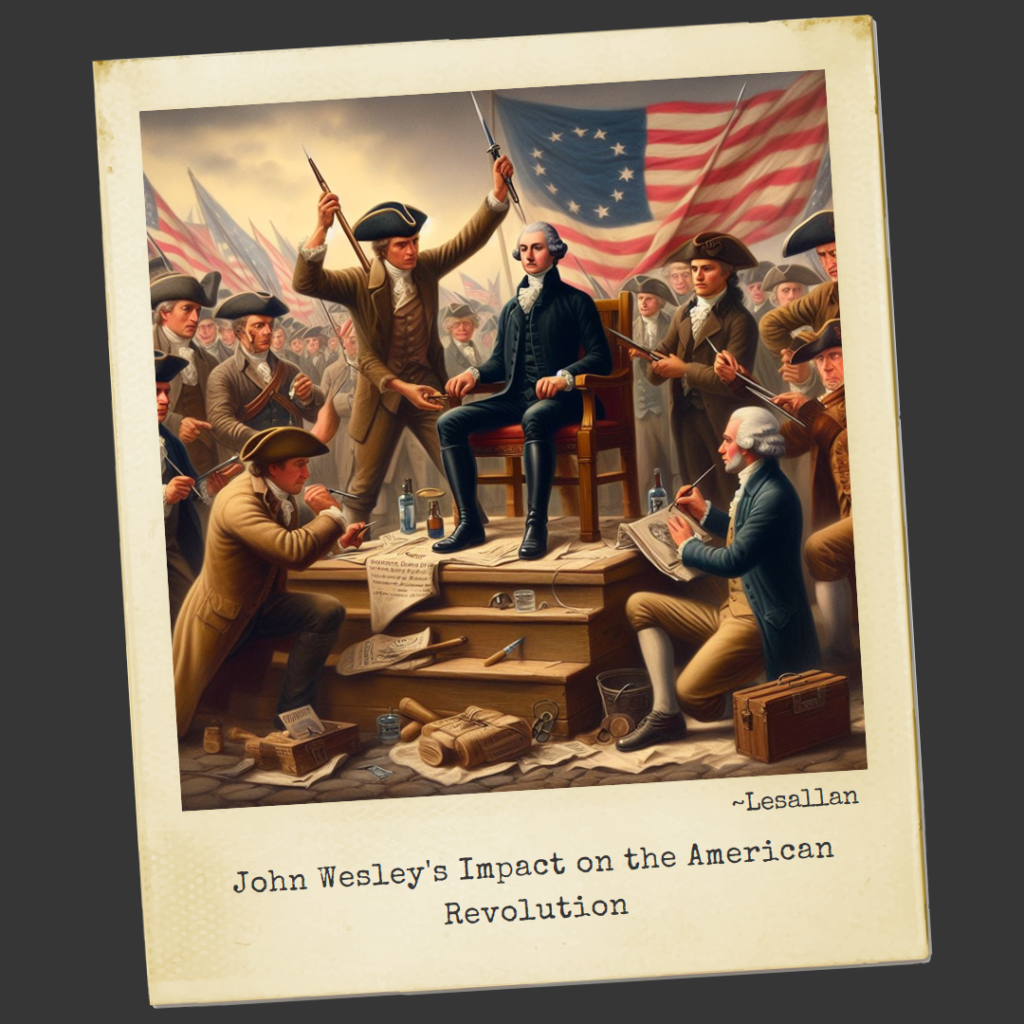
Written by Lesallan – January 30, 2024
John Wesley and His Role in the American Revolution
John Wesley, a prominent figure in the Methodist movement during the 18th century, faced a dilemma when the American Revolution erupted in 1775. Despite his opposition to the colonists’ rebellion against the British crown, Wesley published a pamphlet titled “A Calm Address to Our American Colonies,” urging them to remain loyal and obedient (Collins, 1999). Despite his position, many of Wesley’s American followers were not in agreement with him, as they strongly supported the cause of independence and were resentful of his intervention.. This essay will delve into Wesley’s lack of support for the American Revolution and the consequent issues surrounding the formal separation from the Methodist movement in the New World.
John Wesley, a prominent theologian, opposed the American Revolution due to his theological convictions that God had ordained all civil authorities and should be respected and obeyed. According to Wesley, rebellion against the king was a sin and a violation of divine order. He also expressed concern that the revolution would lead to anarchy, violence, and bloodshed, which would undermine the spread of the gospel and the work of God. In his own words, Wesley wrote, “O horror upon horror! that those who are now called Christians should ever be concerned in such a work as this; destroying one another by fire and sword; plundering, ravaging, burning their innocent fellow-creatures; men, women, and children; together with their houses, their goods, their cattle; all that comes in their way!” (Wesley, 1775/2014, p. 10) (Collins, 1999).
Wesley’s opposition to the American Revolution can be attributed to his personal ties to England and his unwavering loyalty to the king. Wesley’s deep-rooted English identity and his reverence for the British constitution and the rule of law were the driving forces behind his stance. As noted by Wesley, he held King George III in high esteem, considering him a pious and benevolent monarch. Wesley’s admiration for the king was evident in his writings: “I love his person; I reverence his office; I esteem him as a governor; I honour him as my king” (Wesley, 1775/2014, p. 9). Additionally, Wesley envisioned England as a model Christian nation, a source of blessings for the world. Therefore, he strongly opposed the idea of a civil war that could weaken and divide his homeland (Collins, 1999).
Wesley’s opposition to the American Revolution was a subject of heated criticism and controversy. His followers in America contested his views and asserted that his stance was disconnected from their situation and requirements. They maintained that their struggle for liberty and justice entitled them to resist tyranny and oppression. Moreover, they accused Wesley of being hypocritical and inconsistent since he had supported previous revolutions such as the Glorious Revolution of 1688 and the Protestant Reformation. Furthermore, they pointed out that Wesley himself had violated some of England’s laws by preaching in open fields and ordaining ministers without episcopal authority (Collins, 1999).
The American Revolution had a significant impact on the Methodist movement in America, leading to its formal separation from the parent body in England. In 1784, John Wesley, the founder of Methodism, ordained Thomas Coke as superintendent or bishop for America and sent him to organize the Methodists there into an independent church. Coke, in turn, ordained Francis Asbury as his coadjutor, and together, they convened the Christmas Conference in Baltimore. At this historic conference, they adopted the name of The Methodist Episcopal Church, a radical step that broke with the tradition of Anglicanism and established Methodism as a distinct denomination in America (Collins, 1999).
Wesley’s divergence from the American Revolution and his decision to sever ties with the Methodist movement in America can be perceived as both favorable and unfavorable. On the one hand, Wesley exhibited his steadfastness and consistency by upholding his principles and convictions, even at the expense of losing influence and popularity. Furthermore, he demonstrated his concern for tranquility and order, as well as his deference for authority and tradition. On the other hand, Wesley’s incompatibility with the grievances and aspirations of his American followers led to their alienation. Moreover, his failure to participate in a momentous event that shaped the destiny of a burgeoning nation was a missed opportunity (Collins, 1999).
Blessings,
Lesallan
References:
Collins, K. J. (1999). A real Christian: The life of John Wesley. Abingdon Press.
Wesley, J. (2014). A calm address to our American colonies (1775). In J. Rieger & K. J. Kim (Eds.), Methodist and radical: Rejuvenating a tradition (pp. 7-16). Wipf & Stock Publishers. (Original work published 1775).


